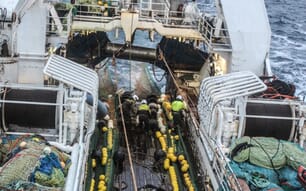Over recent years, the economically important stocks of cod and haddock have been decreasing. This year the groundfish fleet is facing a further reduction in cod quota by almost 80 per cent.
Cod stocks have been falling year on year, most likely due to overfishing, which has stopped them re-spawning, but, also because of warming waters, which have probably caused stocks to migrate further North.
An increase in water temperature of around 4oC has also affected the local lobster industry, causing an abundance of lobsters. With an over supply, many lobstermen are, therefore, seeing a reduction in the price paid. Prices have fallen to around $2.25 a pound compared with $3.25-50 prior to 2008.
Prices are also driven by shell quality, with the real value lying with the harder shelled lobsters as they are tough enough to be transported to markets further inland. However, catches of these are harder to get as they lie further off the coast. With diesel prices and other input costs rising, it is also becoming harder to go further offshore.
Local lobsterman Curt Brown told TheFishSite that everyone is competing for space and everyone wants to be the first to land your catch to try and get the best price.
On visiting the Portland Fish Exchange, one of the biggest fish auctions, it was clear to see the affect the cod quota cut is having.
General Manager of the Portland Fish Exchange, Bert Jongerden, told TheFishSite that the total volume coming into the auction is decreasing year on year and more low valued species are coming in, for which there is little maket.
For more information on fish prices, last week's auction prices can be seen here.
To try and solve problems fishermen in the Gulf of Maine are facing, the Gulf of Maine Research Institute is working on projects such as better net design and seafood marketing. By working with local restaurants, the GMRI is helping to promote lower valued species, which in turn benefits fishermen and the environment.
The institute is also working with local fishermen on better net design to reduce the need to discard and also on more sustainable fishing methods.
It remains uncertain what the future will be for this important industry but, despite this, the GMRI is working hard to educate the next generation on fishing and marine biology through its state wide school programme.




